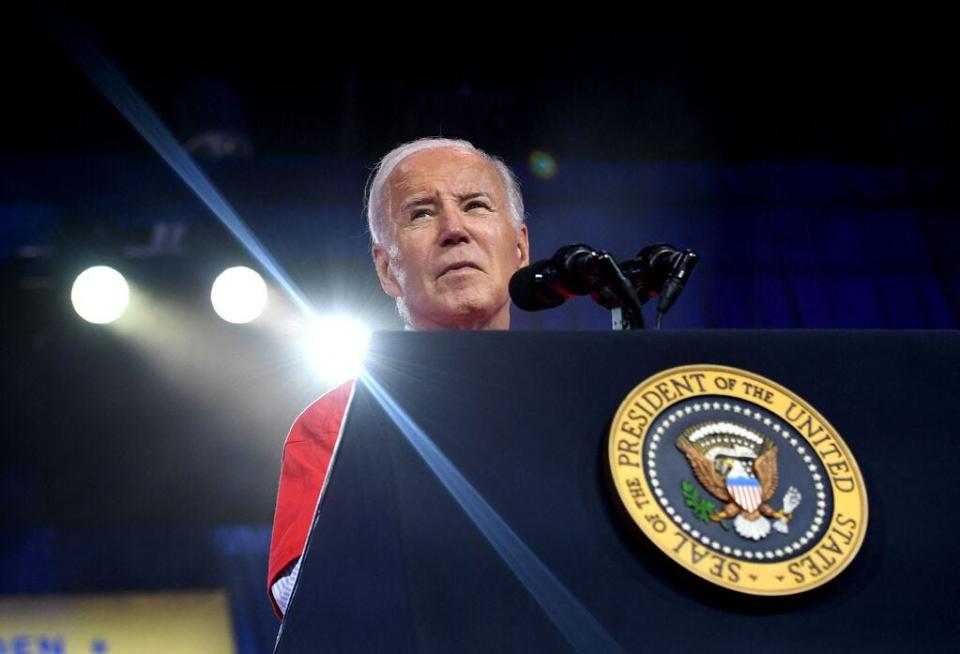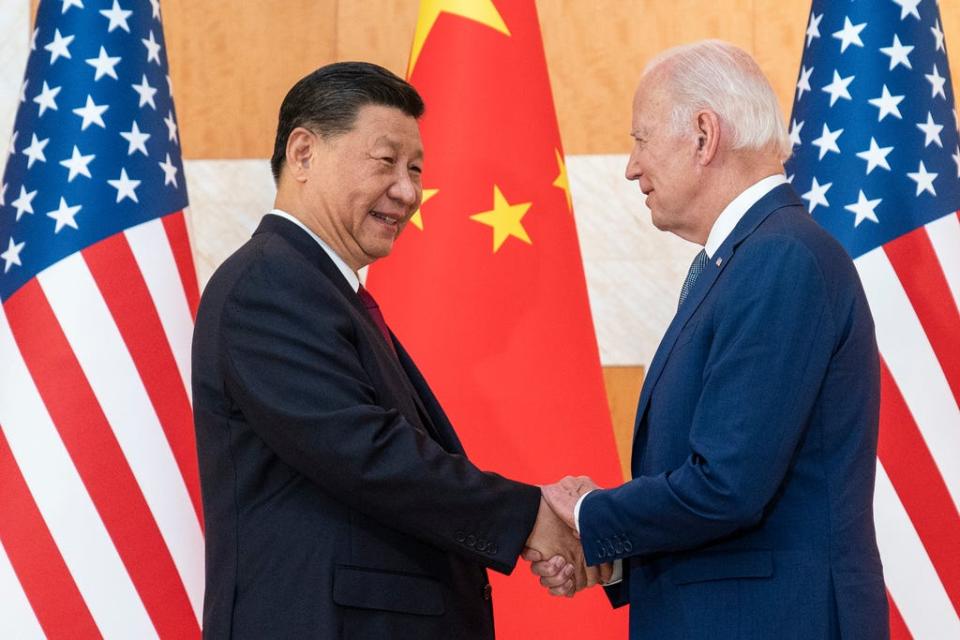In Joe Biden's world, the US is a beacon of democracy. Has his vision fallen out of step with voters?
WASHINGTON ? President Joe Biden’s vision for America’s role in the world has always been a shining city on a hill. That vision – once cherished by Democrats and Republicans alike – has given way to much greater cynicism.
Americans are worried about being able to buy a house and pay for groceries. The prospect of proxy wars is unappealing, and after Afghanistan and Iraq, voters are deeply uneasy about the risk of getting drawn into overseas entanglements. To many born after 9/11, there’s a bigger existential question about whether the U.S. is still a beacon for other countries to emulate.
Biden is stuck in the middle, trying to mediate between his ideal about how he should lead and the widespread frustration of his citizens.
It will soon come to head as Biden welcomes the leaders of more than a dozen countries, including Chinese President Xi Jinping, to a major economic and trade summit for Pacific powers in San Francisco.

A series of polls in the past two weeks have shown widespread discontent among the public with the direction the country is headed. Americans do not believe Biden’s leadership on the world stage has been effective. His lackluster support inspired a primary challenger, and last week the chief strategist for Barack Obama’s presidential campaigns suggested Biden should not seek office again.
The threat of a government shutdown and a bitter dispute with hard-right Republicans over the White House’s funding request for wars in Israel and Ukraine have also cast a shadow over the summit, where Biden hoped to convince potential allies the U.S. is a reliable partner.
“This will be a tough time for President Biden to do it,” said Peter Feaver, who worked for multiple presidents on the National Security Council. “This is a hard test for the administration.”
It is the second time in six months that a poorly-timed dispute with Congress has disrupted Biden’s plans to woo Pacific countries he hopes to draw away from China.
He had to return home from an overseas trip early – canceling stops in Papua New Guinea and Australia – during the debt ceiling fight with House Republicans in May. He promised to roll out the red carpet for Australia's prime minister during a state dinner instead. But that gathering in late October ultimately had to be scaled back in the face of the conflict between Israel and Hamas.
Biden is in another battle with House Republicans over federal spending now. A year out from the general election, the Democratic president is also navigating a difficult reality: Voters surveyed are saying they prefer Donald Trump, who is promising to negotiate an end to Russia's war against Ukraine, carry out mass deportations and ban refugees from any nation he considers a security threat.
Biden's domestic agenda got a shot in the arm last Tuesday when Democrats and abortion rights prevailed in off-year elections the president and his team view as indicative of a 2024 landscape that might work in their favor.
And his diplomatic efforts yielded some success last week when Israel announced that it would implement short humanitarian pauses in northern Gaza that will help civilians leave embattled areas and aid to be delivered more quickly.
But whether that’s enough for voters is at the heart of the question.
The agreement fell short of the cessation in fighting of at least three days that Biden had sought from Israel. John Kirby, a chief White House spokesman on national security, was quick to argue that the pauses were a “direct result of his personal leadership and diplomacy here.”
Voters concerned about Biden’s leadership
Biden, who turns 81 next week, has struggled to persuade Americans he has the mental fitness to be president.
A survey of registered voters in battleground states released last week by The New York Times and Siena College found a large majority of the electorate, 71%, believe Biden is too old to be president. On the question of mental sharpness, 62% said Biden doesn’t have it.
The poll showed Biden trailing Trump in five out of six states that are likely to determine the winner of next November’s election.
In response to the first survey, former Obama adviser David Axelrod said there is “legitimate concern” pulsating through the Democratic Party about Biden’s reelection prospects.
The president must decide whether it “is wise” for him to continue his candidacy and “whether it's in HIS best interest or the country's,” Axelrod said on X, formerly Twitter.
“Biden obviously has lost a step,” Republican Rep. Mike Gallagher, chair of the House committee on competition between the U.S. and China, said in an interview.
He pointed to Biden’s comment last year about “a minor incursion” into Ukraine. “I'm not sure that anybody, like, fears Biden on the world stage in a way that would help us.”
The president has made foreign policy a pillar of his reelection argument. But in a CNN poll published last week, just 36% of Americans viewed him as an effective world leader. That compared with 48% who viewed Trump that way.

Biden dismissed the bad polling during comments at a fundraiser, and his campaign denied, in response to a query from USA TODAY, that there’s a disconnect between the president’s focus on American leadership abroad and the anxiety that voters are feeling about domestic issues such as the economy.
To the extent that there is, deputy campaign manager Quentin Fulks said, it is the campaign's job to bridge that gap.
Fulks went on to warn: “Now is not the time for a rookie.”
It is not a time “to honestly put someone back who has already driven our country, both foreign policy wise and economically, to the brink of destruction that President Biden has gotten to work to bring back,” he said.
Turmoil in Congress ahead of Xi meeting
Democratic lawmakers were far more concerned about the message Biden’s dispute with Congress over foreign assistance sends to leaders who are attending the Asia-Pacific Economic Cooperation summit this week in San Francisco. Especially Xi.
Biden is scheduled to meet with the Chinese president Wednesday to discuss the wars and the future of Taiwan before the larger summit begins.
Massachusetts Rep. Jake Auchincloss said that by slow-walking an aid package that includes money for Israel, Ukraine and the Indo-Pacific, “We are undercutting the strength of whatever message President Biden is able to deliver.”
“Congress should be sending President Biden into his meeting with Xi Jinping in a position of strength,” said Auchincloss, a Democrat who sits on the China committee.
The government will shut down on Friday, as the summit concludes, unless Congress reaches a consensus or Republicans muscle through a short-term fix. House Speaker Mike Johnson unveiled a two-step bill, which keeps federal funding at its current levels for some parts of the government until January and other parts until February, to his caucus over the weekend. The House and Senate would need to pass the legislation and Biden would have to sign it by the end of the week to avoid a shutdown.
Rep. Raja Krishnamoorthi, an Illinois Democrat and ranking member on the China panel, said House Republicans are creating “chaos and dysfunction” that is harming Biden’s efforts on the world stage.
“I think the CCP has used specifically those particular issues and their propaganda around the world to try to shape peoples' attitudes toward democracy versus authoritarian governments. So it really undercuts us in different ways,” he said, using another name for China.

But, he noted, China is facing economic issues that are worse than those of the United States. The costs of goods are higher than Americans would prefer, yet job growth has been strong and the unemployment rate remains low.
“In contrast, America's economy is doing relatively well. So I don't think that they should be gloating about anything, walking into that kind of meeting, although we could do better to improve our hand, too,” he said.
The conversation is expected to yield little in the way of immediate results, but the administration believes the in-person meeting between Biden and Xi is necessary to stabilize relations between the world’s two largest economies.
It will precede two days of roundtables among representatives from APEC’s 21 members, which include Russia, Taiwan, Hong Kong and Japan and other economies.
Biden's foreign policy flex
Biden is scheduled to leave Washington on Tuesday for the summit, which concludes Friday. The White House declined to say last week whether it was considering changes to his schedule in light of the government funding deadline.
The summit will provide Biden with an opportunity to demonstrate his foreign policy acumen to Americans who have lost confidence in his ability to lead the country.
“I think Americans are reacting to a sense that events are spinning faster and faster. And they're reflecting their anxiety, I think, in their analysis of the incumbent,” Auchincloss said.
That said, “I feel very confident that the president's handling of Ukraine, of Israel, of Taiwan, is going to age very well. That years from now, when people are looking back at the Biden presidency on foreign policy, it’s going to be regarded as a significant strength of the administration.”
He suggested that Americans are engaged in revisionist history about Trump’s record, pointing to George W. Bush, who left office deeply unpopular at the beginning of a decades-long conflict with Afghanistan and after a war with Iraq, but is rated more favorably now.
Feaver, who served on the National Security Council under Bush, said the same could happen with Biden. But, he said, “That's very thin consolation right now.”
This article originally appeared on USA TODAY: Biden to balance ideals, growing public frustration at APEC summit
